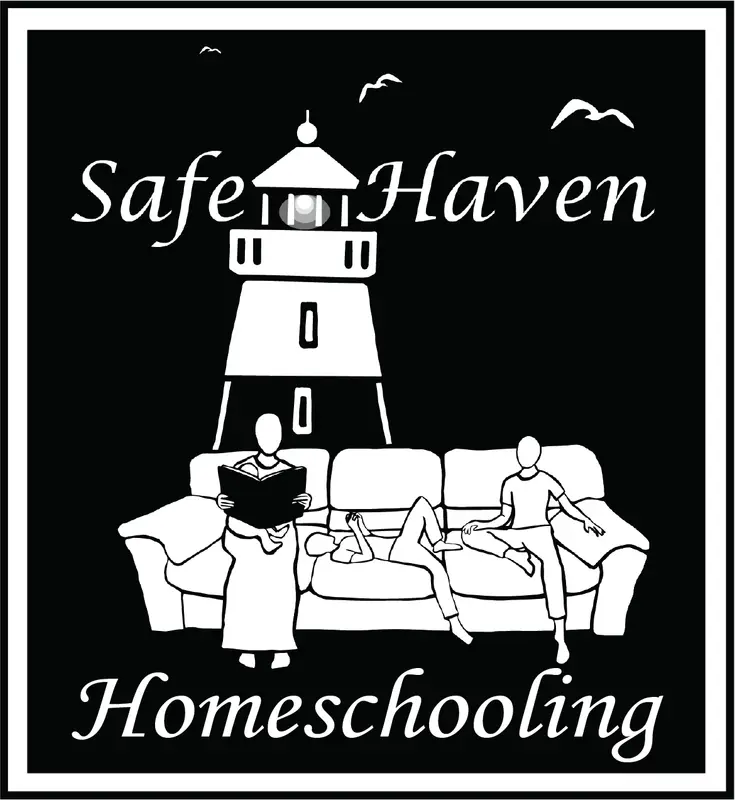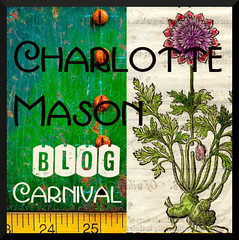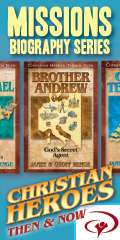| I’m so glad to see you again!
Last month, I told you that I would tell you a story about how God surprised me when I was feeling like homeschooling was not really going the way it should.
And how He used a tiny caterpillar to change the atmosphere in our home.
Here it is:
A Blessed Birthday Surprise
I remember a time when I felt like my kids were all drifting—not just from each other, but from me, too. Even though we were home together every day, it felt like we were living separate lives. Everyone was doing their own thing, and we hardly spent any time truly together.
Homeschooling had always been about learning side by side, growing as a family. But somewhere along the way, that togetherness seemed to fade. My heart ached for connection.
So on my birthday, I asked for just one thing: I wanted all ten of my kids to go on a walk with me. Just a simple walk along the trail behind our neighborhood. That was it.
Now, you have to understand—my kids are strong-willed and fiercely independent. If they already had something in mind, convincing them to change course wasn’t easy. But when I told them that was all I wanted for my birthday, they (reluctantly) paused their video games and other distractions, put on their shoes—no small task!—and joined me.
As we walked down the street, I realized we probably looked like a small parade. Not that anyone was around to see it—but it made me smile.
The trail led us past the flooded woods, typical of that part of Illinois. These woods were more like swamps, not the kind I loved to explore. Still, we took it in. Patrick said he’d gone back there before, but it was a little spooky.
We all began noticing the beauty around us—wildflowers, buzzing insects, tall grasses swaying in the breeze. I love nature, and I’ve passed that love on to my children, so this became an impromptu nature walk. My soul felt full again. It had been too long since we’d all done something like this. Just being together. I was so happy.
Then I noticed some plants that reminded me of milkweed—the kind I remembered from Ohio, where they were thick and plain. These were different: slender stalks, delicate pink blossoms. But something in me knew—they had to be a kind of milkweed.
I paid attention because years ago I had raised Monarch caterpillars, feeding them milkweed leaves. My daughter Katie noticed the plants too and picked a few to take home. She pointed out a tiny caterpillar clinging to one of the leaves. I was mildly curious—until we got home.
When I looked closer, I realized—it was a Monarch caterpillar.
Excitement bubbled up. I placed the plant in a jar, and sure enough, the little guy started munching away. Soon we needed more leaves, so Patrick went back to the swampy trail and brought more. The caterpillar grew quickly, gaining bold black, white, and yellow stripes. He was beautiful—and definitely a Monarch.
We started researching again—how long until a chrysalis? How long inside before the butterfly emerged? It had been years since I’d done this.
We learned it would take about two weeks for the caterpillar to form its chrysalis, and another two weeks until it became a butterfly.
All the kids were suddenly invested. They checked on him daily, made sure he had fresh milkweed, and tracked his progress. This little caterpillar became our family pet. When he finally formed his chrysalis, everyone celebrated. We couldn’t wait for the butterfly to emerge.
That tiny caterpillar brought us all together again. It became a shared family project that filled our home with wonder and joy.
And I knew—it was no accident.
God had given me a special surprise for my birthday. He heard the quiet cry of my heart and answered it in the sweetest, most unexpected way. He didn’t just bring us together for one walk—He gave us something beautiful to share for weeks afterward.
Sometimes life feels stale. Ordinary. Disconnected. We can feel disappointed or discouraged—especially when things don’t go the way we hoped.
But God is always good.
He never leaves us—not even in the quiet, messy, weary seasons. And sometimes, He sends a little surprise—just to remind us how deeply we’re loved.
So if your heart feels heavy today, tell Him. He’s listening.
And keep your eyes open. Look for the small signs of His love—like a caterpillar on a milkweed leaf.
You never know how He might bring joy back into your life.
If you let Him.
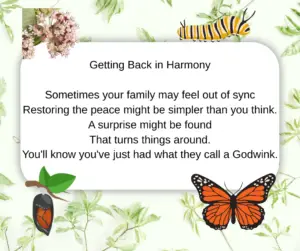 
If you are a nature nerd like me, and this story whetted your appetite for raising caterpillars, check out Caterpillar Chronicles on my blog. Here’s the first post in the series, but click on the Category called Caterpillar Chronicles to follow our adventures and my research on raising caterpillars.
Here’s a devotional journal page to go with this story about looking for God’s blessings in the ordinary and trusting Him with the cry of your heart. And here’s another devotional page that’s more colorful.
My Latest Project
🔥I shared an interview last month that I did on Blossoms of My Life Radio Show. It was about the journey of fire my family endured which I wrote about in my book, Refined By Fire. If you didn’t hear that interview, hit reply and ask me for the link, and I’ll send it right to you.🔥
📚Well, Ramona interviewed me again after that, and we talked about homeschooling.📚
I mostly talked about how to get started homeschooling for those who might be interested. But if you know someone who might benefit from hearing it, please pass it on to them. Here’s the link (this also includes the transcript).
You can also hear it on Spotify HERE. Encourage those who are thinking about it to go ahead and take the plunge and see how wonderful homeschooling can be!
A Crafty Bible Study for Mother Culture
Hey, Have you ever wanted to learn how to do pretty lettering and coloring and Bible journaling?
JoDitt Williams is a graphic designer who has a community for women who love to do Bible journaling, coloring, lettering, and lots of creative activities. Her community on Skool is called Fruitful Creativity with JoDitt. I just joined a couple months ago, and I have learned so much from her already.
I made this for my word of the year:
If you have ever thought you’d like to learn how to do lettering or coloring techniques or Bible journaling, this community would be the perfect way to learn with lots of other Christian women who love the Lord and love reading the Bible.
There is a new theme every month that JoDitt gives assignments for us to work on and she gives teachings and examples that help us to dive into the Bible and find out what God is saying to us each month.
JoDitt homeschooled her children and is a strong Christian who loves the Bible and family and creating. You’ll love her!
You can see her books on Amazon.
Curriculum Idea
If you have a first grader, and you haven’t found a curriculum that you love yet, check out this First Grade Curriculum Guide and Weekly Review.
As a former first grade teacher and having homeschooled all 10 of my kids in first grade, I felt pretty qualified to put this curriculum guide together.
The way it works is this:
1. You look at the guide before the week begins. You get the suggested books from the library or order them. There are Amazon links for your convenience.
2. You read the books to your child during the week. Some weeks have suggested books for Science and Social Studies. Some weeks don’t have as many. You can obviously choose your own books. These are just suggestions.
3. Then at the end of the week, probably Friday, you have your child do the review sheet for the week.
The review sheets contain simple questions and problems from the reading you did during the week. Plus simple Language Arts and Math.
You are expected to have a phonics and reading program that’s separate from this. And a Math program. This was primarily set up as a quick review of what they learned at the end of each week.
Each review page covers 6 subjects: Language Arts, Copywork, Math, Science, Social Studies, and Art. Just one square for each subject.
Check it out here and see if this is the curriculum guide you’ve been looking for!
I just added a new product to my Teachers Pay Teachers store. It’s a ✨ Back-to-School Scripture & Schedule Pack – Printable Set for Christian Homeschool Moms ✨
I’m selling it in my store, but for you, my loyal readers, I’m offering it to you FREE! Use these links to get the Planner pages and the Scripture cards for free.
Planner pages:
https://drive.google.com/file/d/13W_jYdfx2ixNBK4hnnKXnbc3GULvrKkb/view?usp=sharing
Scripture cards:
https://drive.google.com/file/d/1XEWWQVCIuUqtHuW_bR87Zt-6nlIldf3R/view?usp=sharing
You’re welcome!!! 🤗
Here’s another new product I just put in my Teachers Pay Teachers store. It’s A Year of Devotional Journaling for Homeschool Moms. This bundle includes scripture and affirmation cards that go with the journal. If you would rather just have the journal, you can get it HERE.
You can also purchase the cards separately, but the bundle is a better deal!
Health tip for this month: Avoid fluoride. Choose Xylitol instead for your toothpaste.
Here are just a few of the numerous health benefits of xylitol
• Looks, tastes and behaves like sugar and is totally interchangeable
• Suitable for diabetics due to low glycemic index
• Antibacterial, antiviral for protecting against and fighting infections
• Antifungal, fighting candida, yeast and other fungal infections
• Alkalizing, thereby helping to maintain the body at a healthy alkaline pH
• Probiotic and therefore feeds “good microbes” to strengthen the immune system
• Anti-pathogenic microbial, killing bad microbes that weaken the immune system
• Stabilizes insulin and hormone levels in harmony with the endocrine system
• Reduces craving for food and calories, thereby assisting weight loss
• Beneficial for helping sinus, ear and nose infections
Xylitol looks, tastes and behaves like sugar without all the harmful health consequences while being extremely beneficial for general health.
From Natural News
For adults, xylitol can help reduce plaque and bacteria, strengthen tooth enamel, prevent cavities, and promote fresh breath. It is especially beneficial for those with dry mouth, as it stimulates saliva production.
Here’s the article
This toothpaste called Himalaya Botanique looks like a good fluoride-free toothpaste. It contains xylitol, pomegranate, neem and triphala. It also seems a little more affordable than others I looked at.
If you also want to remineralize your teeth, you could try this toothpaste which also contains xylitol:
Himalaya Botanique Whitening + Hydroxyapatite Toothpaste, Mint Flavor – Nano Hydroxyapatite to Support Remineralization and Restore Enamel
A chewing gum which contains xylitol called Spry actually works to prevent cavities as you’re chewing it. Spry also has mints that contain xylitol. They increase saliva production, stop bad breath, and may also help fight off cavities.
From Natural News article.
I’ve been chewing a gum called pür gum. I got the spearmint flavor on Amazon. I like it. I haven’t chewed gum in a long time, but I thought I would try it to see what xylitol does for me. I just got it, so I’ll let you know later what I observe.
An important fact to know about xylitol is that it is toxic to dogs. Make sure you keep any product with xylitol up where your pets can’t get to it.
Also I read an article that said they didn’t recommend using it as a sweetener substitute because it causes diarrhea.
But it seems to be a good solution for toothpaste and gum and mints.
Join us next month when we will talk about Faith Over Fear in Homeschooling!
If there’s anything I can help you with, just reach out to me. I can help with curriculum choices or problems. Or I can help you find solutions to problems that might be coming up as you try to homeschool, take care of babies and toddlers, cook and clean the house, and the million other things you have to do. I’ve been there. I know you can do this! And I would be honored to come alongside you with encouragement and solutions.
To book a 15 minute call with me just go to:
https://calendly.com/safehavenhomeschool
If you have a friend who you think would like to read this newsletter, please pass it on!
Safe Haven Homeschooling
My books on Amazon
Curriculum I’ve created with a Charlotte Mason twist plus other conventional types of curriculum
E-course I created – The Basics of Learning and Homeschooling
Coaching Course I created – Also called The Basics of Learning and Homeschooling – I take you through the course and do a coaching call with you each month
My shop for homeschool merch, t-shirts, mugs, notebooks, phone covers, and much more!
linktr.ee/penneydouglas – All the places you can find me!
Changed By Love – My original Blog about Homeschooling, Family, Faith, and Alternative News
My YouTube Channel – Safe Haven Homeschooling Channel – Homeschool Encouragement for Newbies and Burnt-out veterans, Family projects, Relationship Building, and Interviews with Homeschool Experts
My Substack – Where I share posts with a rich blend of educational insight, spiritual encouragement, and practical wisdom to help families embrace homeschooling as a lifestyle—not just a school alternative.
|



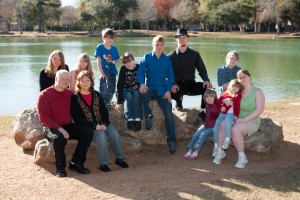
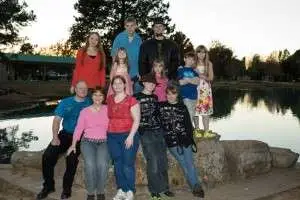
![DSC01581[1]](https://www.penneydouglas.com/wp-content/uploads/2011/10/DSC015811-300x200.webp)
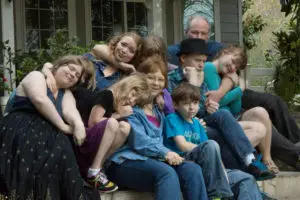
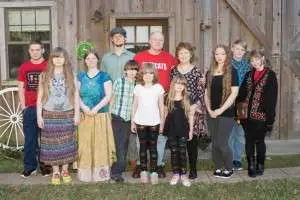
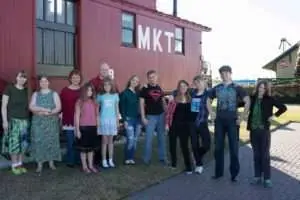
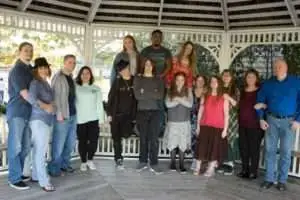
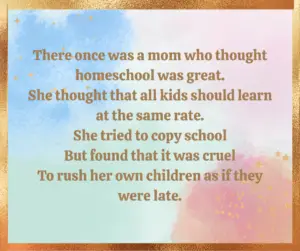

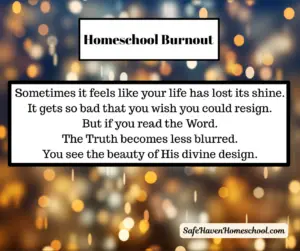


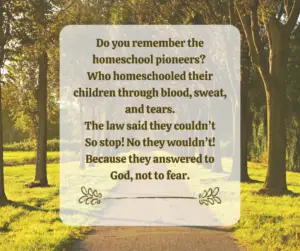





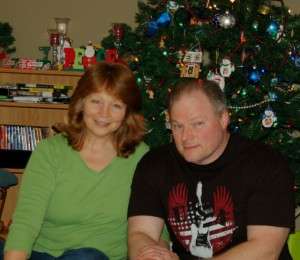

 "Oh that God would give every mother a vision of the glory and splendor of the work that is given to her when a babe is placed in her bosom to be nursed and trained! Could she have but one glimpse in to the future of that life as it reaches on into eternity; could she look into its soul to see its possibilities; could she be made to understand her own personal responsibility for the training of this child, for the development of its life, and for its destiny,--she would see that in all God's world there is no other work so noble and so worthy of her best powers, and she would commit to no other's hands the sacred and holy trust given to her." -JR Miller
"Oh that God would give every mother a vision of the glory and splendor of the work that is given to her when a babe is placed in her bosom to be nursed and trained! Could she have but one glimpse in to the future of that life as it reaches on into eternity; could she look into its soul to see its possibilities; could she be made to understand her own personal responsibility for the training of this child, for the development of its life, and for its destiny,--she would see that in all God's world there is no other work so noble and so worthy of her best powers, and she would commit to no other's hands the sacred and holy trust given to her." -JR Miller